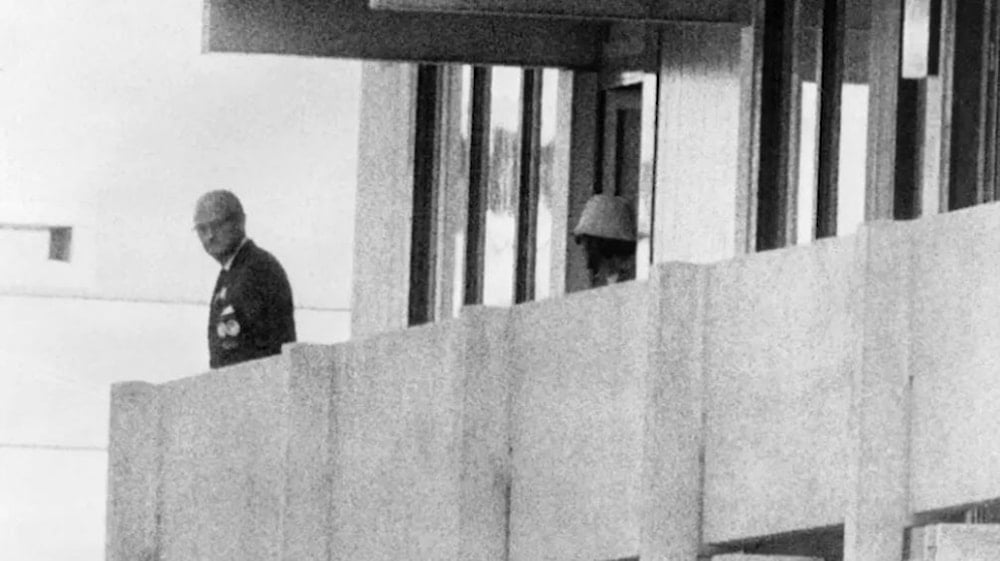Guardian: Declassified files show West's role in Mossad assassinations
Newly released documents show Western intelligence aided Mossad in tracking and killing Palestinians in Europe during the 1970s, without public oversight.
-

A Palestinian "militant" appears on the balcony of the Olympic Village building where members of "Israel's" Olympic team were taken captive, in Munich, Germany, on September 5, 1972. (AFP)
A trove of newly declassified documents has revealed that Western intelligence agencies secretly supplied the Mossad with crucial information that enabled Israeli operatives to track and kill Palestinians allegedly involved in operations across Western Europe in the 1970s, as reported by The Guardian. The intelligence sharing took place without the knowledge or oversight of elected officials or parliamentary bodies, raising serious questions about legality and democratic accountability.
According to The Guardian, the Mossad’s assassination campaign was launched in response to the killing of 11 Israeli athletes at the 1972 Munich Olympics by armed Palestinian Resistance members. Over the following decade, at least 10 individuals "Israel" alleged to be "militants" were assassinated across European cities, such as Paris, Rome, Athens, and Nicosia. The clandestine support from Western governments, although never publicly acknowledged, played a critical role in enabling these killings.
The evidence was uncovered by Dr. Aviva Guttmann, a historian of strategy and intelligence at Aberystwyth University, who discovered encrypted communications in Swiss archives. These cables were part of a secret intelligence-sharing system codenamed Kilowatt, established in 1971. The network included 18 intelligence agencies from countries such as the US, UK, France, Italy, Switzerland, West Germany, and "Israel", and allowed them to exchange raw intelligence about safe houses, vehicle details, and the movements and tactics of individuals considered threats, as reported by The Guardian.
Palestinian targets identified through Kilowatt network
Dr. Guttmann said the intelligence shared was often extremely detailed, directly linking individuals to specific plots and offering information that would significantly assist operational planning. She noted that even after public reporting and circumstantial evidence suggested that Mossad was conducting targeted killings, Western agencies continued sharing information and even sent results of their own investigations back to Mossad.
The first assassination, that of Wael Zwaiter, a Palestinian intellectual and translator working at the Libyan embassy in Rome, took place just weeks after the Munich attack, according to The Guardian.
Zwaiter was killed in the lobby of his apartment building.
While defenders have long insisted he had no "militant" ties, several Western agencies had pegged him as a logistics provider for the Black September Organization (BSO), the group behind the Munich operation.
Book cover release day with @CambridgeUP! Coming to bookshops near you in 2025! pic.twitter.com/WzWnBv4skd
— Dr Aviva Guttmann (@GuttmannAviva) December 6, 2024
Mahmoud al-Hamshari, the PLO’s official representative in France, was killed in Paris in December 1972. Kilowatt files claimed he was tied to recruitment activities and described his activities in fundraising and diplomacy. A year later, Mohamed Boudia was assassinated in Paris because of intelligence passed on by Swiss authorities.
Boudia’s car had been tracked after Swiss agents raided a Geneva safe house, and Mossad operatives planted a landmine on his vehicle in Paris.
“I’m not sure the Israeli campaign would have been possible without the tactical information from the European intelligence services,” said Guttmann. “It was of huge benefit, and they knew they had that tacit support.”
Public fallout and questions of oversight
The most notorious blunder of the campaign occurred in July 1973, when Mossad agents killed a Moroccan waiter in Lillehammer, Norway, believing him to be Ali Hassan Salameh, a senior figure in the BSO. The mistaken identity was confirmed using the only available photograph of Salameh, which had been provided by the British domestic intelligence service, MI5.
Several Israeli operatives were arrested, prompting international outrage and forcing Israeli Prime Minister Golda Meir to suspend the operation, according to The Guardian.
Despite the backlash, Guttmann found evidence that Western agencies continued to provide Mossad with intelligence on Palestinian figures well beyond 1973. A former Mossad operative told The Guardian that while he and his team were unaware of the origin of their intelligence, they were confident in its reliability.
Palestinian fighters also retaliated during this period. According to former Resistance operatives, the campaign became a “war of the spooks” between Mossad and armed factions like the PFLP and BSO, resulting in the deaths and injuries of Israeli agents in cities such as Madrid and Brussels.
Guttmann warned that the Kilowatt files offer critical lessons for the present, especially in the context of "Israel’s" ongoing war on Gaza, which began following the October 7, 2023, Al Aqsa Flood Battle. In the Gaza genocide, more than 50,000 Palestinians, mostly civilians, have so far been killed.
She argued that intelligence-sharing between states continues to operate in a space of profound secrecy, often without the awareness of elected officials or the public.
“International relations of the secret state are completely off the radar of politicians, parliaments, or the public,” Guttmann said. “Even today, there will be a lot of information being shared about which we know absolutely nothing.”

 5 Min Read
5 Min Read










